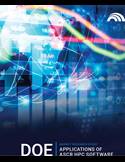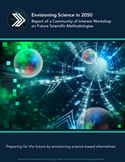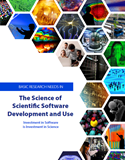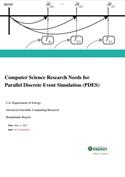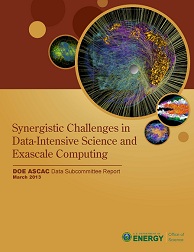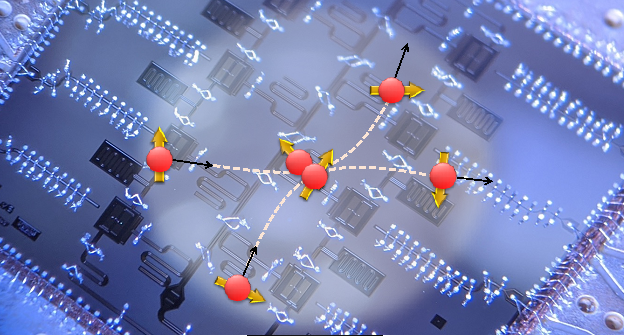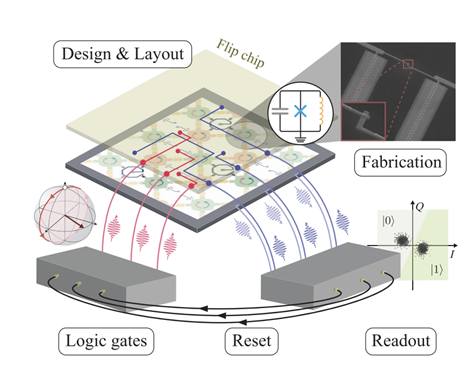ASCR Program Documents
Provided below is a listing of relevant articles, plans and ASCR-sponsored workshop reports.
Select this link to view the ASCR Program Documents Archive
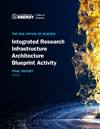 Integrated Research Infrastructure Architecture Blueprint Activity: Final Report
Integrated Research Infrastructure Architecture Blueprint Activity: Final Report
In 2022, The Office of Science (SC) leadership directed the Advanced Scientific Computing Research (ASCR) program to conduct the Integrated Research Infrastructure Architecture Blueprint Activity (IRI ABA) to produce a reference framework to inform a coordinated, SC-wide strategy for IRI. This activity convened the SC science programs and over 150 DOE national laboratory experts from all 28 SC user facilities across 13 national laboratories to consider the technological, policy, and sociological challenges to implementing IRI. Through a series of cross-cutting sprint exercises facilitated by the IRI ABA Leadership Group and peer facilitators, participants produced an IRI Framework based on the IRI Vision (see callout below) comprising IRI Science Patterns spanning DOE science domains, IRI Practice Areas needed for implementation, IRI blueprints that connect Patterns and Practice Areas, and overarching principles for realizing the DOE-wide IRI ecosystem. The resulting IRI framework and blueprints provide the conceptual foundations to move forward with organized, coordinated DOE implementation efforts.
Final Report: August 2023
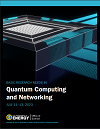
Basic Research Needs in Quantum Computing and Networking
In July 2023, DOE’s Advanced Scientific Computing Research (ASCR) program in the Office of Science convened the Workshop on Basic Research Needs in Quantum Computing and Networking. Employing quantum mechanical resources in computing, information processing, and networking opens the door to potential exponential advantages over classical counterparts. However, quantifying and realizing such advantages poses extensive scientific and engineering challenges. Department of Energy (DOE) investments have driven steady progress in addressing such challenges. Recently developed quantum algorithms offer asymptotic exponential advantages in speed or accuracy for fundamental scientific problems. These problems include simulating physical systems, solving systems of linear equations, differential equations, and optimization problems. The following five priority research directions (PRDs) were identified as a result of the workshop: end-to-end software toolchains to program and control quantum systems and networks at scale; efficient algorithms delivering quantum advantages; benchmarking, verification, and simulation methods to assess quantum advantages; resilience through error detection, prevention, protection, mitigation, and correction; and hardware and protocols for next-generation quantum networks.
Brochure, January 3, 2024 | Report
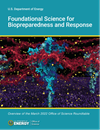
Foundational Science for Biopreparedness and Response
This report is based on an SC Roundtable on Foundational Science for Biopreparedness and Response, which was held in March 2022 and included attendees from DOE’s national laboratories, industry, and other governmental agencies. The roundtable focused on understanding DOE’s unique role in addressing future biological crises, bringing together capabilities in the physical, computational, and biological sciences. Participants identified five priority research opportunities (PROs) and the specialized cross-cutting capabilities needed to support biopreparedness studies at DOE national user facilities. The identified PROs are inherently multidisciplinary, requiring coordination across ASCR, BER, and BES, and defined underlying science and technology advances needed for ensuring the nation’s future preparedness and response to biological crises.
Toward a Seamless Integration of Computing, Experimental, and Observational Science Facilities: A Blueprint to Accelerate Discovery
The Department of Energy, Office of Science operates world-leading facilities for experimental, observational, and computational science. A transformation of science is underway, with workloads at supercomputing facilities increasingly driven by this explosion of data from instruments and experimental facilities, as well as the accelerating use of Artificial Intelligence (AI) as a tool for scientific discovery. A seamless integration of computing, networking, instruments, and experimental facilities is required to support these emerging workloads and open up a new frontier of U.S. leadership in scientific discovery.
Market Research Study: Applications of ASCR HPC
The ASCR program has developed hundreds of software tools for high performance computing (HPC). DOE is interested in making its HPC software portfolio available to the public in order to maximize the value of what has been developed. This document, organized by the name of the ASCR-funded software, provides illustrations of how a sample of these tools have been used to advance industry applications. This report was funded by DOE through a contract for Phase 0 Outreach and Assistance for the Small Business Innovation Research/Small Business Technology Transfer Programs Office.
Envisioning Science in 2050
To explore future-focused questions that could impact the future of DOE, a Community of Interest (COI) on Future Scientific Methodologies, sponsored by the Office of Advanced Scientific Computing Research (ASCR), was held over three non-consecutive days in November 2020. The COI’s charge was to create a vision for how future computational fabrics might shape, and be shaped by, scientific and technological advances over the next 10 to 30 years.
Basic Research Needs for the Science of Scientific-Software Development and Use
In December 2021, ASCR convened a workshop on basic research needs for the Science of Scientific Software Development and Use (SSSDU). Workshop participants identified three priority research directions (PRDs) and three important crosscutting themes that center on the following overarching insight: software has become an essential part of modern science that impacts new discovery, policy, and technological development. To have full confidence in science delivered via software, we must improve the processes and tools that help us create and use it, and this enhancement requires a deep understanding of the diverse array of teams and individuals doing the work.
Roundtable Report: Parallel Discrete Event Simulation (PDES)
In September 2021, ASCR convened a roundtable to discuss computer-science research needs for Parallel Discrete Event Simulation (PDES). This report presents a sample of important applications with their inherent discrete event technology elements. Needs are outlined in core areas of parallel discrete event research as well as cross-cutting directions in computer-science research that positively impact scientific advancements across several important application areas. Priority research opportunities in advanced computing for PDES are identified.
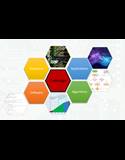
Workshop on Reimagining Codesign
In March 2021, DOE’s Advanced Scientific Computing Research convened the Workshop on Reimagining Codesign. Codesign in High Performance Computing and Artificial Intelligence has been critical to the design and implementation of contemporary computer architectures. The process of codesign must be reimagined to be continuous, agile, and secure to reflect the new reality of rapid change in both workloads and architectures. The workshop was organized around discussions on eight topic areas, and from these, four priority research directions were identified.
Workshop Brochure: March, 2022 | Workshop Report
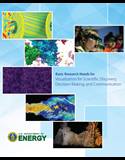
Visualization for Scientific Discovery, Decision-Making, and Communication
Department of Energy’s (DOE) Office of Advanced Scientific Computing Research (ASCR) sponsored a Basic Research Needs workshop in January 2022 to understand the major opportunities and grand challenges in visualization tools and technologies for scientific computing, with a special focus on DOE-relevant applications and goals. The workshop identified five priority research directions (PRDs) for visualization to support scientific discovery, decision-making, and communication.
Workshop Brochure: January 1, 2022
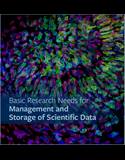
Basic Research Needs for Management and Storage of Scientific Data
In January 2022, ASCR convened a workshop to identify priority research directions in the area of data management for high-performance and scientific computing. Attendees were challenged to identify promising approaches that would support the breadth of the DOE mission, including the explosion of artificial intelligence (AI) uses and the growing needs of experimental and observational science. Technological and science drivers were identified and considered as they relate to key aspects of data management such as interfaces, architectural design, and FAIR principles (Findable, Accessible, Interoperable, and Reusable).
Workshop Brochure: January 1, 2022 | Report
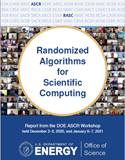
ASCR Workshop on Randomized Algorithms for Scientific Computing
This report summarizes the outcomes of the ASCR workshop on "Randomized Algorithms for Scientific Computing (RASC)" held virtually across four days in December 2020 and January 2021. Randomized algorithms have enabled significant advances in artificial intelligence (AI) and represent a foundational research area in advancing AI for Science. Future advancements in DOE Office of Science priority areas such as climate science, advanced materials, combustion, and quantum computing all require randomized algorithms for surmounting challenges of computational complexity, robustness, and scalability.
Workshop Report: April 1, 2021
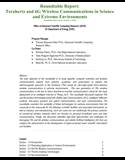
Roundtable Report: Terahertz and 6G Wireless Communications in Science and Extreme Environments
The main objective of the roundtable is to explore the potential of Terahertz (THz) and 6G communications in extreme environments such as industrial, manufacturing, and large critical scientific facilities (for example, light sources, accelerators, high-performance computers, data centers, neutron sources, etc.). In contrast to commercial wireless networks (5G included), which are optimized for best-effort broadband voice and Internet of Things (IoT) services.
Report October 1, 2020
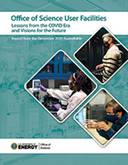
Office of Science User Facilities Roundtable December 2–15, 2020
In December 2020, the U.S. Department of Energy Office of Science convened a virtual Roundtable of its scientific user facilities to discuss facility challenges and lessons learned during the COVID-19 pandemic as well as facility responses, best practices, and innovations that could be adopted going forward. Roundtable participants included facility staff, users, and user executive committee chairs. This report summarizes their discussions, which encompassed topics such as user research and facility operations in virtual and physically distanced contexts; user training and engagement; computation, data, and network resources; and crosscutting issues.
PDF of this Report Report Date: July 2021
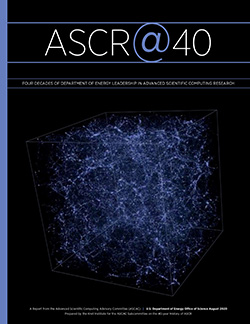 |
ASCR@40 : Four Decades of Department Of Energy Leadership in Advanced Scientific Computing ResearchIn December 2017, the Advisory Committee for DOE’s Office of Advanced Scientific Computing Research (ASCR) was asked to document some of the major impacts of ASCR and its predecessor organizations. This seemingly simple request kicked off a multi-year process of information gathering, distilling, curating, and refining. Input was provided by over 100 scientists. Full Report |
 |
A Quantum Path ForwardToday, many scientific experts recognize that building and scaling quantum-protected and enhanced communication networks are among the most important technological frontiers of the 21st century. The international research community perceives the construction of a first prototype global quantum network—the Quantum Internet—to be within reach over the next decade. In February 2020, the U.S Department of Energy (DOE)’s Office of Advanced Scientific Computing Research hosted the Quantum Internet Blueprint workshop to define a potential roadmap toward building the first nationwide quantum Internet. The workshop participants included representatives from DOE national laboratories, universities, industry, and other U.S. agencies with serious interests in quantum networking. The goal was to provide an outline of the essential research needed, detail any engineering and design barriers, and suggest a path forward to move from today’s limited local network experiments to a viable, secure quantum Internet. |
 |
5G Enabled Energy Innovation Workshop (5GEEIW)On March 10-12, 2020, the Office of Science (SC) organized a three-day workshop to deliver a community-based report highlighting 5G and beyond basic research, development, applications, technology transition, infrastructure, and demonstration opportunities in support of the U.S. DOE mission. The brochure and report will help the DOE Office of Science understand both the challenges and the opportunities offered by 5G and emerging advanced wireless technologies in the areas of basic research, development, and integration into scientific user facility operations. |
 |
Data and Models: A Framework for Advancing AI in ScienceOn June 5, 2019, the Office of Science (SC) organized a one-day roundtable to focus on enhancing access to high-quality and fully traceable research data, models, and computing resources to increase the value of such resources for artificial intelligence (AI) research and development and the SC mission.1 In this report, we consider AI to be inclusive of, for example, machine learning (ML), deep learning (DL), neural networks (NN), computer vision, and natural language processing (NLP). We consider “data for AI” to mean the digital artifacts used to generate AI models and/or employed in combination with AI models during inference. In part, this roundtable was motivated by the recognition that a large portion of science data currently are not well suited for AI. |
 |
Storage Systems and I/O: Organizing, Storing, and Accessing Data for Scientific DiscoveryIn September, 2018, the Department of Energy, Office of Science, Advanced Scientific Computing Research Program convened a workshop to identify key challenges and define research directions that will advance the field of storage systems and I/O over the next 5–7 years. The workshop concluded that addressing these combined challenges and opportunities requires tools and techniques that greatly extend traditional approaches and require new research directions. Key research opportunities were identified. |
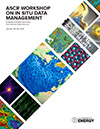 |
ASCR Workshop on In Situ Data ManagementIn January 2019, ASCR convened a workshop on In Situ Data Management (ISDM). The goal was to identify priority research directions (PRDs) to support current and future scientific computing needs, which will increasingly incorporate a number of different tasks that need to be managed along with the main simulation or data analysis tasks. The workshop identified six PRDs that highlight the components and capabilities needed for ISDM to facilitate scientific discovery from a variety of different data sources. |
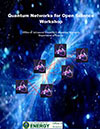 |
Quantum Networks for Open Science (QNOS)DOE convened the Quantum Networks for Open Science (QNOS) Workshop in September 2018. The workshop was primarily focused on quantum networks optimized for scientific applications with the expectation that the resulting quantum networks could be extended to lay the groundwork for a generalized network that will evolve into a quantum internet (Q-Internet). Cover | Workshop Report |
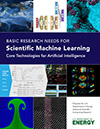 |
Report on Basic Research Needs for Scientific Machine Learning: Core Technologies for Artificial IntelligenceScientific Machine Learning (SciML) and Artificial Intelligence (AI) will have broad use and transformative effects across the Department of Energy. Accordingly, the ASCR January 2018 Basic Research Needs workshop report identifies six Priority Research Directions (PRDs) as viewed through the lens of applied mathematics and scientific computing. The six PRDs provide a sound basis for a coherent, long-term research and development strategy in SciML and AI. Cover | Workshop Report | Brochure |
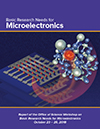 |
Basic Research Needs Workshop for MicroelectronicsThis report is based on a workshop on Basic Research Needs for Microelectronics, which was held October 23–25, 2018, and sponsored by ASCR, BES, and HEP. The goal of the workshop was to identify basic research needs associated with advanced microelectronics technologies for applications relevant to the DOE mission, including computing, power grid management, and science facility workloads. |
 |
Report for DOE ASCR Basic Research Needs Workshop on Extreme HeterogeneityIn the 2025–2030 time frame, external economic drivers and design diversity will result in systems built from a custom aggregation of components; and the difficulty and complexity of developing scientific software will increase. This fundamental change in computer architecture design has been deemed the era of “extreme heterogeneity.” The 2018 Basic Research Needs Workshop on Extreme Heterogeneity identified five Priority Research Directions for realizing the capabilities needed to address the challenges posed in this era of rapid technological change. |
 |
Exascale Requirements Review Crosscut ReportDuring fiscal years (FYs) 2015 and 2016, the Exascale Requirements Reviews brought key computational domain scientists, U.S. Department of Energy (DOE) planners and administrators, and experts in computer science and applied mathematics together. Meetings were held for each of the DOE’s six Office of Science (SC) program offices. The results of the six reviews have been published in reports available on the web here and at http://exascaleage.org/. This report is based off the six reviews and a final crosscut review including all six program offices and held in early 2017. The report presents a summary of the individual reports and of common and crosscutting findingings, and it identifies opportunities for productive collaborations among the DOE SC program offices. See the Exascale Requirements Review (MainpageExternal link) for more information on this report (report.pdf file XMB) and information on the five other Exascale Requirements Reviews. |
 |
DOE Network 2025: Network Research Problems and Challenges for DOE Scientists WorkshopGuided by (1) a desire for an overall million-fold increase in bulk data transfer rates over the next decade and (2) a need to support a more complex and diverse mix of traffic flows over current and future networks, the DOE Network 2025 workshop, held in Bethesda, Maryland, February 1–2, 2016, articulated an integrated R&D portfolio to achieve these goals. The workshop identified short-, medium-, and long-term challenges to guide a robust network research program within the DOE Advanced Scientific Computing Research program. Integrated and agile protocols and related technologies must be developed and tailored to these science environments in the short- and medium-terms by leveraging current backbone capacities and their future enhancements to multiple 100 Gbps and Tbps rates. New capabilities and services need to be integrated into these networks to support complex and dynamic network traffic flows. For more information:
|
 |
DOE EXASCALE REQUIREMENTS REVIEW — ASCRDuring fiscal years (FYs) 2015 and 2016, the Exascale Requirements Reviews brought key computational domain scientists, U.S. Department of Energy (DOE) planners and administrators, and experts in computer science and applied mathematics together. Meetings were held for each of the DOE’s six Office of Science (SC) program offices. For the ASCR Research Exascale Requirements Review, the available computing environment was decomposed into three tiers to clarify the differences in platform readiness and provide a common language to address the different types of systems and their associated needs. See the Exascale Requirements Review Mainpage for more information on this report and information on the five other Exascale Requirements Reviews. |
 |
DOE EXASCALE REQUIREMENTS REVIEW — BER/ASCRDuring fiscal years (FYs) 2015 and 2016, the Exascale Requirements Reviews brought together key computational domain scientists, U.S. Department of Energy (DOE) planners and administrators, and experts in computer science and applied mathematics. Meetings were held for each of DOE’s six Office of Science (SC) program offices. DOE SC convened an Exascale Requirements Review for the Biological and Environmental Research (BER) division, which took place on March 28–31, 2016, in Rockville, Maryland, and brought together leading BER researchers and program managers, scientific and HPC experts from the ASCR facilities and scientific computing research areas, and DOE’s BER and ASCR staff and ESnet personnel. See the Exascale Requirements Review Mainpage for more information on this report and information on the five other Exascale Requirements Reviews. |
 |
DOE EXASCALE REQUIREMENTS REVIEW — FES/ASCRDOE SC convened its programmatic Exascale Requirements Review for Fusion Energy Sciences on January 27–29, 2016, in Gaithersburg, Maryland. The review brought together nearly 100 participants to interact regarding areas of expertise, challenges faced, and possibilities for the future exascale computing environment. After DOE and ASCR presenters highlighted tasks to be accomplished (or at least initiated) during the review, a number of FES domain scientists highlighted FES science drivers, focusing on scientific goals to be pursued over the next decade and how exascale computing would play a role in reaching these goals. See the Exascale Requirements Review Mainpage for more information on this report and information on the five other Exascale Requirements Reviews. |
 |
DOE EXASCALE REQUIREMENTS REVIEW — NP/ASCRDuring fiscal years (FYs) 2015 and 2016, the Exascale Requirements Reviews brought key computational domain scientists, U.S. Department of Energy (DOE) planners and administrators, and experts in computer science and applied mathematics together. Meetings were held for each of the DOE’s six Office of Science (SC) program offices DOE SC convened an Exascale Requirements Review for the NP program on June 15–17 in Gaithersburg, Maryland. The review brought together leading nuclear physics researchers and program managers, scientific and HPC experts from the ASCR facilities and scientific computing research areas, and DOE NP and ASCR staff . See the Exascale Requirements Review Mainpage for more information on this report and information on the five other Exascale Requirements Reviews. |
 |
BES COMPUTING AND DATA REQUIREMENTS IN THE EXASCALE AGEThe DOE SC Exascale Requirements Review for Basic Energy Sciences brought together key computational domain scientists and DOE planners and administrators to determine the requirements for an exascale ecosystem that includes computation, data analysis, software, workflows, HPC services, and the full range of computer requirements to support forefront scientific research in basic energy science through 2025. See the Exascale Requirements Review Mainpage for more information on this report and information on the five other Exascale Requirements Reviews. |
 |
HEP COMPUTING AND DATA REQUIREMENTS IN THE EXASCALE AGEThe DOE SC Exascale Requirements Review for High Energy Physics brought together key computational domain scientists, DOE planners and administrators, and experts in computer science and applied mathematics to determine the requirements for an exascale ecosystem that includes computation, data analysis, software, workflows, HPC services, and whatever else is needed to support forefront scientific research in high energy physics through 2025. See the Exascale Requirements Review Mainpage for more information on this report and information on the five other Exascale Requirements Reviews. |
 |
2014 Runtime Systems SummitThis report summarized runtime system challenges for exascale computing, that follow from the fundamental challenges for exascale systems. Some of the key exascale challenges that pertain to runtime systems include parallelism, energy efficiency, memory hierarchies, data movement, heterogeneous processors and memories, resilience, performance variability, dynamic resource allocation, performance portability, and interoperability with legacy code. In addition to summarizing these challenges, the report also outlined different approaches to addressing these significant challenges that have been pursued by research projects in the DOE-sponsored X-Stack and OS/R programs. It also included a chapter on deployment opportunities for vendors and government labs to build on the research results from these projects. Link to the report... |
 |
Neuromorphic Computing – Architectures, Models, and Applications WorkshopThis workshop report describes basic research and development challenges and opportunities in the area of Neuromorphic Computing relevant to the U.S. Department of Energy (DOE) Advanced Scientific Computing Research (ASCR) program office. The focus of the workshop was to define a 10-20 year basic research and development roadmap for neuromorphic computing, a beyond-CMOS approach to future computing. The workshop was held during June 29 to July 1, 2016, at the Oak Ridge National Laboratory (ORNL) in Oak Ridge, TN. Link to the report... |
 |
Management, Analysis and Visualization of Experimental and Observational Data workshopThe purpose of this workshop, held 29 September 2015 through 1 October 2015 in Bethesda, MD, is to help the Advanced Scientific Computing Research (ASCR) and research community better understand needs related to the management, analysis, and visualization of experimental and observational data (EOD) collected and generated by experimental and observational science projects (EOS) at Office of Science user facilities. Link to the report... |
 |
Neuromorphic Computing – From Materials Research to Systems Architecture RoundtableThe Office of Science, through its Offices of Advanced Scientific Computing Research (ASCR) and Basic Energy Science (BES) convened a roundtable consisting of 20 national lab, university and industry experts to evaluate computing architectures that go beyond Moore's Law and mimic neuro-biological architectures. The focus was on both advanced materials and scientific computing research opportunities to support development of a new paradigm for extreme and self-reconfigurable computing architectures. Link to the report... |
 |
The 2015 Cybersecurity for Scientific Computing Integrity - Research Pathways and Ideas WorkshopThis workshop focused on three technological areas for understanding and improving cybersecurity namely:
Link to the report... |
 |
The Future of Scientific WorkflowsThe mission of this workshop was to develop requirements for workflow methods and tools in a |
 |
The 2015 Neuro-Inspired Computational Elements WorkshopThis workshop focused on Information Processing and Computation Systems beyond von Neumann/Turing Architecture and Moore’s Law Limits. The workshop brought together researchers from different scientific disciplines and applications areas to provide a nucleation point for the development of next generation of information processing/computation architectures that go beyond stored program architectures and Moore’s Law limits. Link to the report... |
 |
DOE ASCR Workshop on Quantum Computing for ScienceThis report details the findings of the DOE ASCR Workshop on Quantum Computing for Science that was organized to assess the viability of quantum computing technologies to meet the computational requirements of the DOE’s science and energy mission, and to identify the potential impact of quantum technologies. Link to the report... |
 |
The 2015 Machine Learning and Understanding For Scientific Discovery WorkshopThis workshop This workshop focused on three technological areas:
|
 |
The 2015 Cybersecurity For Scientific Computing Integrity WorkshopThis workshop, focused on four technological areas:
|
 |
Storage Systems and Input/Output to Support Extreme Scale ScienceFour priority research directions emerged from this activity:
|
 |
The 2014 Workshop on Modeling & Simulation of Systems and ApplicationsModSim 2014, focused on three critical technological areas:
|
 |
NERSC Large Scale Computing and Storage Requirements for Basic Energy Sciences Research: Target 2017The latest review revealed several key requirements, in addition to achieving its goal of characterizing BES computing and storage needs. High-level findings are:
|
 |
NERSC Large Scale Computing and Storage Requirements for Fusion Energy Sciences Research: Target 2017The latest review revealed several key requirements, in addition to achieving its goal of characterizing FES computing and storage needs. High-level findings are:
|
Abstract Machine Models and Proxy Architectures for Exascale Computing
In this report our goal is to provide the application development community with a set of models that can help software developers prepare for exascale. In addition, use of proxy architectures, through the use of proxy architectures, we can enable a more concrete exploration of how well application codes map onto the future architectures.
DOE workshop on Software Productivity for eXtreme-scale Science (SWP4XS)
This report presents results from the DOE workshop on Software Productivity for eXtreme-scale Science (SWP4XS) held January 13-14, 2014, in Rockville, MD. The workshop brought together approximately fifty experts in the development of large-scale scientific applications, numerical libraries, and computer science infrastructure to determine how to address the growing crisis in software productivity caused by disruptive changes in extreme-scale computer architectures.
2014 Workshop on Programming Abstractions for Data Locality
The purpose of the Workshop on Programming Abstractions for Data Locality (PADAL) was to identify common themes and standardize concepts for locality-preserving abstractions for exascale programming models.
Applied Mathematics Research for Exascale Computing
This report details the findings and recommendations of the DOE ASCR Exascale Mathematics Working Group that was chartered to identify mathematics and algorithms research opportunities that will enable scientific applications to harness the potential of exascale computing. The working group organized a workshop, held August 21-22, 2013 in Washington, D.C., to solicit input from over seventy members of the applied mathematics community. Research gaps, approaches, and directions across the breadth of applied mathematics were discussed, and this report synthesizes these perspectives into an integrated outlook on the applied mathematics research necessary to achieve scientific breakthroughs using exascale systems.
Accelerating Scientific Knowledge Discovery (ASKD) Working Group Report
Sustained scientific progress over the next decade and beyond will require new advanced discovery ecosystems quite different from the computational and collaborative environments in which most research is performed today. These systems will need to connect increasing numbers of scientists, enable use of data and computational services at unprecedented scales, foster scientific discoveries based on ever more complex cross-disciplinary hypotheses, facilitate the immediate sharing and exchange of existing and emerging knowledge, and provide mechanisms for timely control of and feedback to instruments and simulations. To achieve this goal requires computer science research advances in multiple areas.
Data Crosscutting Requirements Review
In April 2013, a diverse group of researchers from the U.S. Department of Energy (DOE) scientific community assembled in Germantown, Maryland to assess data requirements associated with DOE-sponsored scientific facilities and large-scale experiments.
 |
NERSC Large Scale Computing and Storage Requirements for Biological and Environmental Research: Target 2017The latest review revealed several key requirements, in addition to achieving its goal of characterizing BER computing and storage needs. High-level findings are:
|
 |
NERSC Large Scale Computing and Storage Requirements for High Eneregy Physics Research: Target 2017The workshop revealed several key requirements, in addition to achieving its goal of characterizing HEP computing. The key findings are:
|
2013 report of HEP/ASCR Data Summit
Representatives from the HEP and ASCR communities met at Germantown on April 2-3, 2013, to discuss issues in carrying out science with large datasets and associated data-intensive computing tasks. The authors of this report acknowledge the important contributions made by all of the ASCR and HEP participants at the data summit and thank them for their efforts.
ASCR Modeling and Simulation of Exascale Systems and Applications Workshop
A new process of “Co-Design” is being pursued in which application and computer scientists work toward the common goal of an exascale ecosystem of systems and applications. Modeling and simulation (ModSim) is a critical part of this process.
DOE ASCR Advisory Committee (ASCAC) Data Subcommittee Report,
Synergistic Challenges in Data-Intensive Science and Exascale Computing.
This new report discusses the natural synergies among the challenges facing data-intensive science and exascale computing, including the need for a new scientific workflow.
Summary of Data Requirements for NERSC
Department of Energy Scientists represented by the NERSC user community have growing requirements for data storage, I/O bandwidth, networking bandwidth, and data software and services. Over the next five years, these requirements are well above what would be provided by increases that follow historical trends. This report focuses primarily on the data needs of the modeling and simulation community.
OS/R Report
Department of Energy (DOE) Fault Management WorkshopHeld June 6, 2012 at the BWI Airport Marriot hotel in Maryland. The goals of this workshop were to:
|
Architectures II Workshop Report
Link to the report...
Exascale Tools Workshop Report
Link to the report...
Geant4 Workshop
Link to the report...
 |
DOE Workshop Report on Multiphysics Simulations: Challenges and Opportunities"Multiphysics Simulations: Challenges and Opportunities” considers multiphysics applications from algorithmic and architectural perspectives, where "algorithmic" includes both mathematical analysis and computational complexity and "architectural" includes both software and hardware environments. Many diverse multiphysics applications can be reduced, en route to their computational simulation, to a common algebraic coupling paradigm. Mathematical analysis of multiphysics coupling in this form is not always practical for realistic applications, but model problems representative of applications discussed herein can provide insight. A variety of software frameworks for multiphysics applications have been constructed and refined within disciplinary communities and executed on leading-edge computer systems. It examines several of these, exposes some commonalities among them, and attempts to extrapolate best practices to future systems. Get report at:... |
Report of the ASCR/BES Data Workshop 2011
Report of the Extreme Scale Solvers Workshop, March 8-9, 2012
Magellan Report Cuts Through Cloud Computing Hype
Report of the DOE Workshop on Mathematics for the Analysis, Simulation, and Optimization of Complex Systems September 13–14, 2011
 |
NERSC Large Scale Computing and Storage Requirements for Advanced Scientific Computing Research
|
Scientific Collaborations for Extreme-Scale Science Workshop Report
 |
NERSC Large Scale Computing and Storage Requirements for Fusion Energy Sciences ResearchThe workshop revealed several key points, in addition to achieving its goal of collecting and characterizing computing requirements. Key requirements for scientists conducting research in FES include:
|
Exascale Programming Challenges Workshop Report
Exascale Workshop on Data Analysis, Management, and Visualization
 |
NERSC Large Scale Computing and Storage Requirements for Basic Energy Sciences ResearchWorkshop participants reached a consensus on several key findings, in addition to achieving the workshop’s goal of collecting and characterizing computing requirements. The key requirements for scientists conducting research in BES are:
|
 |
NERSC Large Scale Computing and Storage Requirements for High Eneregy Physics ResearchThe workshop revealed several key points, in addition to achieving its goal of collecting and characterizing computing requirements. The chief findings:
Link to the report.. |
ASCAC Subcommittee Report: The Opportunities and Challenges of Exascale Computing
Scientific Grand Challenges: Cross-Cutting Technologies for Computing at the Exascale Workshop
Scientific Grand Challenges: Architectures and Technology for Extreme Scale Computing
Scientific Grand Challenges: Discovery in Basic Energy Sciences: The Role of Computing at the Extreme Scale
 |
NERSC Large Scale Computing and Storage Requirements for Biological and Environmental ResearchThe workshop revealed several key points, in addition to achieving its goal of collecting and characterizing computing requirements. Chief among them: scientific progress in BER-funded research is limited by current allocations of computational resources. Additionally, growth in mission-critical computing – combined with new requirements for collaborative data manipulation and analysis – will demand ever increasing computing, storage, network, visualization, reliability and service richness from NERSC. Link to the report.. |
Workshop on Computational Science and Chemistry for Innovation
Scientific Grand Challenges in National Security: The Role of Computing at the Extreme Scale
Scientific Grand Challenges: Exascale Workshop Panel Meeting Report
Scientific Grand Challenges: Fusion Energy Sciences and the Role of Computing at the Extreme Scale
Scientific Grand Challenges: Opportunities in Biology at the Extreme Scale of Computing
Scientific Grand Challenges: Challenges for the Understanding the Quantum Universe and the Role of Computing at the Extreme Scale
Scientific Grand Challenges: Forefront Questions in Nuclear Science and the Role of Computing at the Extreme Scale
International Exascale Software Project - A Roadmap
Modeling, Simulation and Analysis of Complex Networked Systems: A Program Plan
Scientific Grand Challenges: Science Based Nuclear Energy Systems Enabled by Advanced Modeling and Simulation at the Extreme Scale
Scientific Grand Challenges: Challenges in Climate Change Science and the Role of Computing at the Extreme Scale
Workshop on Computer Science/Applied Math Institutes and High Risk / High Payoff Technologies for Applications
MidRange Computing in Support of Science at Office of Science Labs
A Scientific Research & Development Approach to Cyber Security
National Science and Technology Council - Federal Plan for Advanced Networking Research and Development
Report of The Panel on Recent Significant Advancements in Computational Science
SciDAC Review
Supercomputing: The New Secret Weapon
Applied Mathematics at the U.S. Department of Energy: Past, Present and a view to the Future
Mathematics for Analysis of Petascale Data Workshop Report
Workshop Report on Advanced Networking for Distributed Petascale Science: R&D Challenges and Opportunities
Scientific Impacts and Opportunities in Computing Workshop Report
Modeling and Simulation at the Exascale for Energy and the Environment Town Hall Meetings Report
Computational Research Needs in Alternative and Renewable Energy
SciDAC Highlighted in CTWatch
Advanced Scientific Computing Research: Delivering Computing for the Frontiers of Science - Facilities Division Strategic Plan for High Performance Computing Resources
Visualization and Knowledge Discovery: Report from the DOE/ASCR Workshop on Visual Analysis and Data Exploration at Extreme Scale
Software Development Tools for Petascale Computing Workshop
Final Report from the Cyber Security Research Needs for Open Science
Computational Subsurface Sciences Workshop Report
Multiscale Mathematics Initiative: A Roadmap
Final Report Second DOE Workshop on Multiscale Problems
Report of the First Multiscale Mathematics Workshop: First Steps toward a Roadmap
Report on the Mathematical Research Challenges in Optimization of Complex Systems
Report on the Workshop on Simulation and Modeling for Advanced Nuclear Energy Systems
Management Model for Delivering High Performance and Leadership Class Computing Systems for Scientific Discovery
Data-Management Challenge
Guide to the NITRD
Federal Plan for High-End Computing


